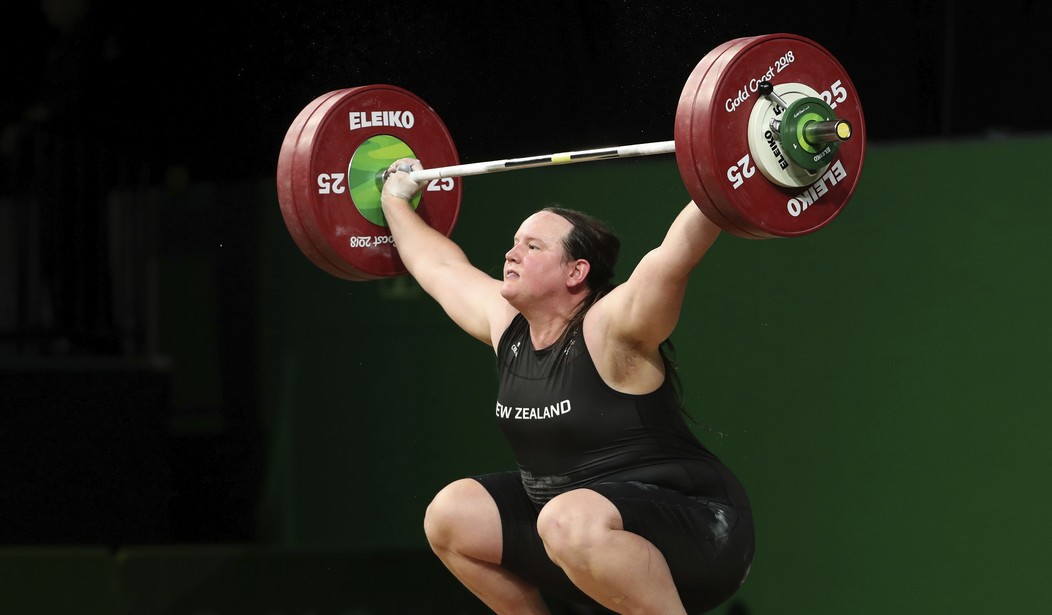New Zealand will set a transgender first by sending a biological male to the Olympics to compete against women in weightlifting. Former Olympians have condemned the decision. Other males competing in women’s weightlifting have set new records, demonstrating the commonsense principle that sports are sex-segregated for a reason.
Laurel Hubbard, who set New Zealand junior records in weightlifting in 1998 before he transitioned to identify as a woman in 2013, qualified for the Olympics in women’s weightlifting due to a 2015 International Olympic Committee (IOC) rule change, CNN reported. According to the Olympics guidelines, males can compete in women’s divisions so long as their testosterone levels stay below 10 nano moles per liter for at least 12 months before their first competition.
Hubbard, 43, suffered a significant injury in 2013.
Recommended: Trans ‘Woman’ Demolishes World Records; Olympian Decries ‘Pointless, Unfair Playing Field’
“I am grateful and humbled by the kindness and support that has been given to me by so many New Zealanders,” the athlete said in a statement. “When I broke my arm at the Commonwealth Games three years ago, I was advised that my sporting career had likely reached its end. But your support, your encouragement, and your aroha [love] carried me through the darkness.”
New Zealand Olympic Committee (NZOC) CEO Kereyn Smith admitted that Hubbard’s presence will be controversial.
“We acknowledge that gender identity in sport is a highly sensitive and complex issue requiring a balance between human rights and fairness on the field of play,” Smith said. “As the New Zealand Team, we have a strong culture of manaaki [respect, care] and inclusion and respect for all. We are committed to supporting all eligible New Zealand athletes and ensuring their mental and physical wellbeing, along with their high-performance needs, while preparing for and competing at the Olympic Games are met.”
A female Belgian weightlifter who has a chance of competing in the same category, the over-87-kilogram super-heavyweights, condemned the obvious advantage Hubbard enjoys.
Speaking to Inside the Games, Anna Vanbellinghen began by insisting that she “fully” supports the transgender community and that she is “aware the defining a legal frame for transgender participation in sports is very difficult.”
“However, anyone that has trained weightlifting at a high level knows this to be true in their bones: this particular situation is unfair to the sport and to the athletes,” the Belgian weightlifter declared.
Vanbellinghen, 27, pointed out that when people take steroids, they retain benefits even years afterward. “So why is it still a question whether two decades, from puberty to the age of 35, with the hormonal system of a man also would give an advantage [in competing against women]?” she asked.
“I understand that for sports authorities nothing is as simple as following your common sense, and that there are a lot of impracticalities when studying such a rare phenomenon, but for athletes the whole thing feels like a bad joke,” the Belgian added. “Life-changing opportunities are missed for some athletes – medals and Olympic qualifications – and we are powerless.”
Vanbellinghen does not oppose transgender identity or activism. In fact, she insisted that the debate about transgenderism in sports “is taking place in a broader context of discrimination against transgender people.” Even so, she could not remain silent.
“Because I do believe that everyone should have access to sports, but not at the expense of others,” she concluded.
Former British Olympic swimmer Sharron Davies also condemned the IOC’s decision to allow Hubbard to compete against women.
“We have men & women’s separate competition [for] a BIG reason, biology in sport matters,” Davies wrote on Twitter. “Separate categories give females equal opportunities of sporting success, the average age of a female Olympic weight lifter is 23. Laurel Hubbard is 43. 30% unfair advantage!”
She concluded with a rallying cry: “Sex, not gender, for sport!”
In 2019, Mary Gregory, a biological man who identifies as a woman, took the Masters world records for women’s squat, women’s bench press, and women’s deadlift.
A study in Journal of Medical Ethics concluded that the IOC’s policies allow biological males who identify as female to maintain a key advantage that constitutes “intolerable unfairness.” Even some suppression of testosterone does not erase a male’s advantages, which begin in the womb.
A study published in The Journal of Clinical Endocrinology & Metabolism concluded that “even after 12 months of hormonal therapy,” a man who identifies as a woman and is taking cross-sex hormones “had an absolute advantage” over female athletes and “will still likely have performance benefits” over women.
People who identify as transgender do indeed face hostility, but their struggles should not require society to flip biology on its head. Allowing biological males to compete against women in women’s sports destroys basic fairness and erases many opportunities for women and girls. When biological males like Mary Gregory set world records for women, they make it extremely difficult, if not impossible, for biological women to compete.
Recommended: Biden DOJ: Preventing Males From Competing ‘Does Nothing’ to Protect ‘Athletic Opportunities for Girls’
Perhaps Laurel Hubbard’s trip to the Olympics will further illustrate the dangerous deception of transgenderism.









Join the conversation as a VIP Member